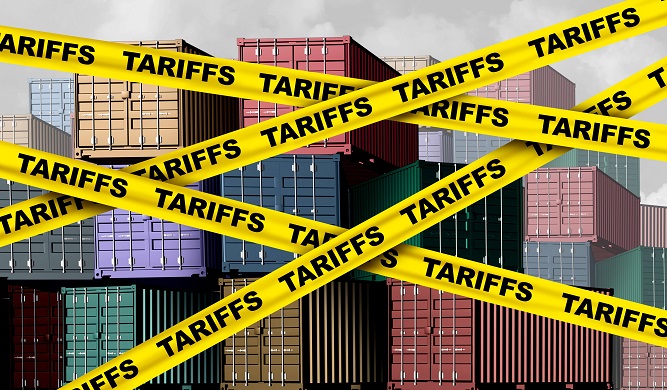President Trump has implemented significant changes to U.S. trade policy by eliminating the de minimis rule, which previously allowed low-cost goods, such as clothing from e-commerce platforms, to enter the United States tax-free. These changes, part of broader executive orders imposing tariffs on the country’s three largest trading partners, are expected to alter how many online purchases are taxed.
The de minimis provision, commonly utilized by e-commerce businesses, allowed goods valued under $800 to be imported without duties. Companies like Shein and Temu relied heavily on this exemption to ship products from China without incurring additional costs, helping them capture a significant share of the U.S. fast-fashion and consumer goods market.
The executive order required that all goods shipped from China, regardless of value, adhere to the same rules as higher-value shipments. Initially, the policy created confusion at the U.S. Postal Service, which temporarily halted the acceptance of packages from China and Hong Kong before reversing its decision 12 hours later.
The elimination of duty-free exemptions for low-cost goods is likely to reshape online sales strategies, especially for companies dependent on direct imports. To mitigate these challenges, Canada and Mexico reached agreements with the U.S. to delay the rollout of tariffs by 30 days. Despite these adjustments, the 10% tariffs on Chinese goods took effect on Tuesday, further complicating cross-border trade operations.
These developments signal a shift toward stricter enforcement of trade rules, with significant implications for global e-commerce and supply chain strategies.

De Minimis: Meaning
The term de minimis, meaning “minimal things,” refers to the threshold under which imported goods can enter a country without incurring duties or taxes. The de minimis provision allows goods valued below a certain threshold to be imported without duties. In the U.S., Congress raised the de minimis threshold from $200 to $800 in 2016, which led to a sharp increase in duty-free imports. This rule enabled e-commerce companies to ship goods directly to American consumers without incurring additional taxes, providing a competitive edge for platforms that source products from overseas—especially from China.
The rule states that packages under $800 in retail value can be imported duty-free per recipient, per day. This streamlined process has been crucial for online retailers like Shein, Temu, and many sellers on Amazon, as it allowed them to offer lower prices by bypassing tariffs.
What is Section 321 and Why is it Important?
Section 321, commonly known as the U.S. de minimis exemption, allows goods valued at $800 or less to enter the country without duties or tariffs. This exemption is vital for many e-commerce businesses, enabling them to minimize costs and maintain competitive pricing.
Key features of Section 321 include:
-
- Tax Exemption: Imports valued at or below $800 avoid duties, tariffs, and import taxes.
-
- Entry Type 86: This program improves compliance by allowing low-value shipments that require oversight by Partner Government Agencies (PGAs) to enter under the Automated Commercial Environment (ACE) system.
Impact on E-Commerce Giants
Retailers like Shein and Temu built much of their business models around the de minimis loophole. Together, these platforms account for approximately 17% of the U.S. discount e-commerce market, offering affordable fashion, toys, and other consumer goods. With the removal of duty-free imports under $800, these companies face new logistical and financial hurdles.
To adapt, some companies have diversified by expanding their partnerships with U.S.-based sellers and investing in domestic warehouses. However, the increased costs may be passed on to consumers, potentially raising prices for goods imported directly from China.
Meanwhile, companies like Amazon that already rely heavily on U.S.-based fulfillment centers stand to benefit from the policy change. By leveling the playing field, U.S.-based retailers may face less competitive pressure from low-cost overseas imports.
How Bergen Logistics Can Help
Bergen Logistics offers tailored solutions to help businesses navigate changes to Section 321, tariffs and global trade regulations. With a network of 3PL facilities across US (3PL facilities ion NJ, CA and Georgia), Canada , Europe, South America, and Asia, Bergen provides:
-
- Strategic Planning: Customized logistics strategies to adapt to evolving trade policies.
-
- Customs Compliance Support: Expert guidance for Section 321 and IMMEX program adherence.
-
- Scalable Fulfillment Solutions: Efficient operations to reduce costs and maintain customer satisfaction.
By staying ahead of regulatory changes, Bergen Logistics helps businesses maintain efficient supply chains in a dynamic global trade environment.


Bergen Logistics Named Top 100 U.S. 3PL for 2026 by Fulfill.com
FOR IMMEDIATE RELEASE North Bergen, NJ – February 24, 2026 – Bergen Logistics, a global third-party logistics (3PL) provider specializing in fashion and lifestyle brands,

Supreme Court Tariff Ruling 2026: How Smart Importers Protect Margins and Win with the Right 3PL Strategy
The recent decision by the Supreme Court of the United States on executive tariff authority is more than a policy update — it’s a strategic

How a Bonded Warehouse Helps CFOs Improve Cash Flow and Financial Control
For today’s CFO, managing cash flow is no longer just a finance function. It is a strategic lever that directly impacts growth, resilience, and competitiveness.
